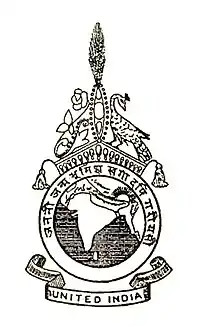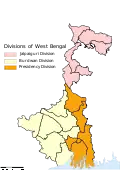Niranjan Sengupta
Niranjan Sengupta(26 July 1904 - 4 September 1969) was a Bengali Indian revolutionary and freedom fighter. He was a leader of Communist Party of India (Marxist).[1]
Niranjan Sengupta | |
|---|---|
নিরঞ্জন সেনগুপ্ত | |
| Member of West Bengal Legislative Assembly | |
| In office 1957 - 1962 | |
| Constituency | Bijpur |
| Member of West Bengal Legislative Assembly | |
| In office 1962 - 1967 1967 - 1968 1969 | |
| Constituency | Tollyganj |
| Minister of Refugee, Relief and Rehabilitation and Jails, Government of West Bengal | |
| In office 1967 - 1968 1969 | |
| Personal details | |
| Born | 26 July 1904 Barisal, British India (modern Bangladesh) |
| Died | 4 September 1969 (aged 66) Kolkata, India |
| Citizenship | India |
| Political party | Communist Party of India (1938 - 1964) Communist Party of India (Marxist) (1964 - 1969) |
| Anushilan Samiti |
|---|
 |
| Influence |
| Anushilan Samiti |
| Notable events |
| Related topics |
Revolutionary activities
Niranjan was a leader of the Barisal branch of Dhaka Anushilan Samiti. In 1929, he was one of the leaders who led to the formation of the neo-violence confederation. In 1930, in connection with the Mechuabazar Bomb Case, he got arrested with 23 others. In 1932, He was sent to the Andaman Cellular jail with other revolutionaries where he became acquainted with Communist ideas.[1]
Later he became a Marxist and joined the Communist Party of India in 1938. He was one of the seven members of an inner committee set up by the Communist Party of India Politburo.[2] He also had important role during the inner-party struggle of this communist party. He was elected as a member of Legislative Assembly of West Bengal in 1957 election from Bijpur. After the split in the Communist Party of India, Niranjan remained with the Communist Party of India (Marxist) (CPI(M)). He was also a minister in the coalition ministry of West Bengal in 1967 - 1968 and 1969.[1]
Notes
- Sengupta, Subodhchandra; Basu, Anjali, eds. (1976). Samsad Bengali Charitabidhan (Vol. 1). Kolkata: Sishu Sahitya Samsad. p. 362. ISBN 978-81-7955-292-6.
- Jyoti Basu. "Memories: The Ones That Have Lasted, Part XI: I am Arrested". Ganashakti. Translated by Dasgupta, Abhijit. Archived from the original on 22 February 2001.
